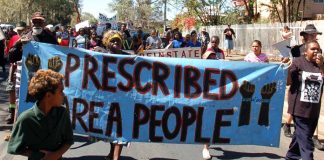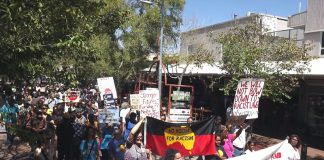A delegation from Aboriginal communities in the Northern Territory who are campaigning against the intervention travelled to Sydney for the Aboriginal Rights Conference in late May. Below Solidarity reprints what two of them told the conference.
Barbara Shaw, Mt Nancy Town Camp near Alice Springs
With the health checks on our kids, they were testing our kids for any STIs or sexual abuse. All up the kids that have had health checks is nearly 7500 and only 39 [may have been] abused, from what doctors are saying. That comes as a bit of a surprise to me because of the [claims that] children that lived on Aboriginal lands were always sexually abused and neglected.
that have had health checks is nearly 7500 and only 39 [may have been] abused, from what doctors are saying. That comes as a bit of a surprise to me because of the [claims that] children that lived on Aboriginal lands were always sexually abused and neglected.
We’re going to keep fighting for our Aboriginal land. We want to stay and maintain and practice our culture.
We’ve gone north and done surveys at Tennant Creek, and Darwin mob are also going to go down to Katherine to do surveys. The communities need to know their rights. They need to know that they can stand up to this big fight if they want to. But it’s a bit hard when you’ve got business managers there making the decisions for the communities themselves. It’s taking control away from the Aboriginal people who want to be able to run their communities.
There’s more of an urban drift now-a lot of people are coming in from [remote] communities. We’ve always had urban drift but the intervention [has] made it worse so there’s more people coming and going.
We’ve always had overcrowding and with the intervention it’s caused [more] problems with overcrowding. With our income management you get store cards at Centrelink. If you haven’t allocated your 50 per cent to the community store you can have it in the nearest township [to] where you live. That’s causing people to come in and shop. We’ve got a problem with prices of food so they’re coming in for cheaper food.
[People travel] from a different community to the next for ceremonies and sorry business. And they go through towns to the hospital or to see their children that are going to school. With Alice Springs being a special place through the Yipirinya dreaming you’re not going to stop people coming to Alice Springs-that’s a sacred place to Aboriginal people.
We pulled into a mango farm [near Tennant creek]-they produce their own alcohol [using] mangos. It just amazed me so I pulled it off the shelf and said “Hey look what they’re selling here”.
And then the lady behind the counter says “We don’t sell that to your kind of people… we don’t sell to Aborigines”. Then Marlene [who is white] goes “Will you sell it to me” and she says “No because you’re in company of an Aborigine”. So we said we don’t feel hungry now and walked out and left our food on the counter.
June Mills, Long-grass Association, Darwin
You can’t spend [quarantined welfare money] anywhere, it’s only at specific stores. If a store doesn’t want to take that card you’ve got to go somewhere else.
Adelaide river is 120 kilometres out of town. They refused to accept that card [there] because along with the cards there are obligations of reporting [on the stores]. There’s some stores that were quite happy to make millions of dollars for years off our people who all of a sudden don’t want to know about it.
So people have to go to some other store that can deal with the reporting they have to do.
People have to get a taxi into town if they have a card to use it at Woolies.
That’s probably over $100 on the taxi fare. At Wadeye which is [420 kilometres] south of Darwin the roads up until two weeks ago were still blocked because of the rain [Wadeye is cut off for five months every year during the wet season].
People couldn’t spend their money on the cards at the Wadeye store, they had to go to Katherine or Darwin. You couldn’t travel on that road; you can’t fly out, it’s too [expensive].
So people were actually starving at Wadeye. The only way they were getting supported was through a food program at the school feeding other people from the community.
Sometimes when they get the card it’s not active for four or five days. People are starving-that’s the reality of this so-called income management.
Even if you talk about a simple phone call. A simple phone call is not a simple phone call if you’ve got to ring Centrelink to get help [from a remote community].
Centrelink don’t give a damn. They’re trying to go through with this program and they’re not stopping unless there’s a mass revolt. They don’t give a damn how our people suffer.
I think the government design is to pressurise everyone so they move off the communities. If you look behind it that’s what it is-you don’t want to be Aboriginal and you don’t want to live on your country.





